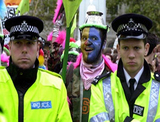
2007-10-28
Instead of going into a complete history, we have concentrated our discussions on two main areas relating to our experiences over the past few years, these are confrontation and anti-media(tion) which encapsulates the ideas of autonomy and self-organisation. This, as well as our G8 analysis, we think will add to the debate surrounding the anti-G8 mobilisations.
The inevitable conflict
Confrontation starts with questioning and defining your own life and what you want from it. Confrontation is refusing to accept the limits of what the state defines as acceptable in order to manage and maintain power.

Dublin Mayday 2004
Conflict is inevitable wherever and whenever we choose to value our own ideas and desires above that of the state. This self-valourisation is the key to the idea of autonomy and connects the world we want to live in to the process of realising it in the here and now.
Confrontation is a decision that we define rather than self-defence which is constructed for us and that we have reacted (either in moralistic or inactive/reactive ways). Autonomy is therefore a basis for all our anti-state actions, both a refusal against the denial of capitalism and a trajectory for constructing our own futures.
Solidarity with prisoners
Confrontation is fundamental to our struggle, and manifests itself on many levels (political/social/cultural). Our activity with Occupied Social Centres reflects this, and has the ability to break from what we see as isolated 'activism' into a social struggle open to society.
Anti-Media(tion) - "Revolt is something you experience not something you film"
Media, especially when controlled by the state and capitalists, presents itself as a common experience. Media, as part of capitalist life, is a global market and therefore exists as a product to be supplied to consumers. By being all things to all people, it constructs beyond our own personal (real) experiences, a manipulated social reality which we except as normal. Issues beyond our personal experiences, when presented by the media as fragmented, unconnected events, become our views and our experiences even though we do not/have not lived them.
Dublin Mayday 2004
By working, communicating, collaborating with the media we become part of the platform where this alienated social reality plays itself out. A re-enforcement of spectacular relationships that does not break the mediation but is itself mediated by the media. If we base our whole struggle on the struggle to maintain and expand our dignity, we include as well the struggle against this mediation.
If we want to participate fully in our lives, and make the connections with others who struggle then we should see the contradiction between mediation and self-organisation.
We want people to understand, not consumer our ideas through the media. Where our stories, quotes, photos stand in isolation, represented to the rest of the world through a journalist or sub editor. Surely the form our ideas transmit themselves is through our interactions, not locked in a page and fixed but dynamic and open.
[http://www.wombles.org.uk/article200610153.php]